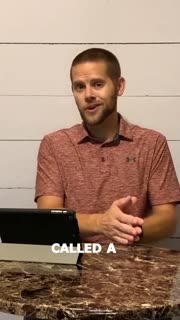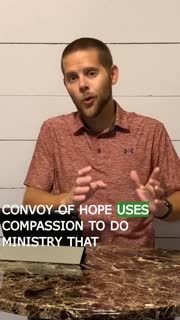Understanding Our Church's Identity and Mission
Devotional
Sermon Summary
Bible Study Guide
Sermon Clips
1. "We are what's called a fellowship of churches. It's a, actually, we use this term called voluntary cooperative fellowship. What it really means is that we are a grouping of churches that are independent of one another, but we agree to work together. We volunteer to enter into this fellowship. And then we do ministry together. We pool resources together, that we have a national and a district leadership. The national leadership is in Springfield, Missouri. The district in Michigan's leadership is found in Brighton, Michigan." [01:09] (33 seconds)
2. "We are what is called an autonomous church within the Assemblies of God, which means as a church, we get to hire whatever pastors we want to, whatever age we want them to be. Whatever level of credentials within the Assemblies of God that the district and national leadership can't tell us what we are to do. We can make those choices because we are an autonomous general council recognized church within the Assemblies of God." [02:25] (24 seconds)
3. "There's different events that happen for the kids and for a youth ministry and for adult ministries, and we volunteer to be a part of that process because we know that we are better when we work together. So we work with other local churches that are Assemblies of God in our area, in our section. We're considered the Metro East section, and so that goes from Auburn Hills all the way to the lake and then down all the way to us, and so it's a nice little pocket of church. We get to work with and interact with, and I love being a part of the Assemblies of God." [03:40] (32 seconds)
4. "We have four things that are the mission of the Assemblies of God. Number one is to evangelize the lost. It is a crucial mission that we evangelize the lost, not just patting ourselves on the back, not just learning more about Jesus ourselves, but we want to evangelize the lost and help them meet Jesus Christ. The second one is to worship God. It's a huge component. We want to come into God's presence and worship him because he is worthy. Number three is we want to disciple believers." [04:50] (29 seconds)
5. "Convoy of Hope uses compassion to do ministry that we want to take care of people and then introduce Jesus to them. We just want to give them Jesus. We want to give them what their body needs, what their spirit needs, and their physical needs are so that they can meet Jesus. And experience him all in the same. So what really makes us different from other churches or other denominations? It's the fact that we are a Pentecostal denomination or fellowship of churches." [06:04] (28 seconds)
6. "Full gospel basically means that if the gospel says it, we believe it and we believe it's for today. That all of the gospel, the full gospel, is the good news that's meant for us today. Pentecost then goes to acts, primarily the whole book of Acts, but we're going to look at Acts 2, 1 through 4, which says, When the day of Pentecost arrived, they were all together in one place. And suddenly there came from heaven a sound like a mighty rushing wind, and it filled the entire house where they were sitting, and divided tongues of fire appeared to them and rested on each one of them." [06:04] (35 seconds)
7. "As a church, we believe that this experience is just as much for today as it was for biblical times. This is one of the things that separates us is that we believe this Pentecostal experience can be felt today, receiving the baptism of the Holy Spirit, the gifts of the Spirit, but the speaking of tongues, that utterance being the initial physical evidence of being baptized in the Holy Spirit." [06:04] (25 seconds)
Ask a question about this sermon
2. "We are what is called an autonomous church within the Assemblies of God, which means as a church, we get to hire whatever pastors we want to, whatever age we want them to be. Whatever level of credentials within the Assemblies of God that the district and national leadership can't tell us what we are to do. We can make those choices because we are an autonomous general council recognized church within the Assemblies of God." [02:25] (24 seconds)
3. "There's different events that happen for the kids and for a youth ministry and for adult ministries, and we volunteer to be a part of that process because we know that we are better when we work together. So we work with other local churches that are Assemblies of God in our area, in our section. We're considered the Metro East section, and so that goes from Auburn Hills all the way to the lake and then down all the way to us, and so it's a nice little pocket of church. We get to work with and interact with, and I love being a part of the Assemblies of God." [03:40] (32 seconds)
4. "We have four things that are the mission of the Assemblies of God. Number one is to evangelize the lost. It is a crucial mission that we evangelize the lost, not just patting ourselves on the back, not just learning more about Jesus ourselves, but we want to evangelize the lost and help them meet Jesus Christ. The second one is to worship God. It's a huge component. We want to come into God's presence and worship him because he is worthy. Number three is we want to disciple believers." [04:50] (29 seconds)
5. "Convoy of Hope uses compassion to do ministry that we want to take care of people and then introduce Jesus to them. We just want to give them Jesus. We want to give them what their body needs, what their spirit needs, and their physical needs are so that they can meet Jesus. And experience him all in the same. So what really makes us different from other churches or other denominations? It's the fact that we are a Pentecostal denomination or fellowship of churches." [06:04] (28 seconds)
6. "Full gospel basically means that if the gospel says it, we believe it and we believe it's for today. That all of the gospel, the full gospel, is the good news that's meant for us today. Pentecost then goes to acts, primarily the whole book of Acts, but we're going to look at Acts 2, 1 through 4, which says, When the day of Pentecost arrived, they were all together in one place. And suddenly there came from heaven a sound like a mighty rushing wind, and it filled the entire house where they were sitting, and divided tongues of fire appeared to them and rested on each one of them." [06:04] (35 seconds)
7. "As a church, we believe that this experience is just as much for today as it was for biblical times. This is one of the things that separates us is that we believe this Pentecostal experience can be felt today, receiving the baptism of the Holy Spirit, the gifts of the Spirit, but the speaking of tongues, that utterance being the initial physical evidence of being baptized in the Holy Spirit." [06:04] (25 seconds)







